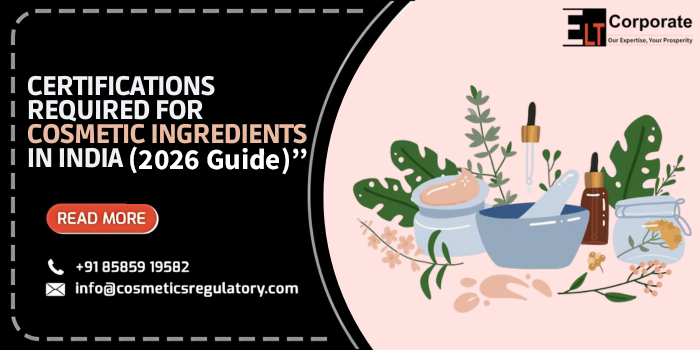We use a variety of cosmetics daily, such as creams, shampoos, soaps, and make-up (cosmetics)! To ensure that cosmetics are safe for humans and meet standards for quality, the Government of India has prescribed some guidelines and certifications.
If you want to manufacture cosmetic products in India in 2026, you must follow the regulatory standards outlined. This guide is written in simple terms and offers insight into the different licenses, product testing and certificates required for cosmetic ingredients and products
Table of Contents
ToggleLegal Framework Governing Cosmetic Certification in India
Cosmetic materials and products are mainly regulated:
- Drugs and Cosmetics Act, 1940
- Drugs and Cosmetics Rules, 1945
- Cosmetics Rules, 2020 (Specific to cosmetics, location of old provisions)
- Guidance Documents by CDSCO (Central Drugs Standard Control Organization)
CDSCO, under the Ministry of Health and Family Welfare, is the Central Licensing Authority for cosmetic imports. State licensing officers handle the manufacturing license.
Import Compliance Requirements for Cosmetics Containing Ingredients
For imported ingredients or finished cosmetics:
- Application through SUGAM Portal (online regulatory platform of CDSCO).
- Form COS-1 → Application for Import Registration Certificate.
- Form COS-2 → Import Registration Certificate issued by CDSCO.
- Fee: USD 1,000 per category + USD 500 per variant.
- Validity: 5 years (renewable).
Documents Required:
Power of Attorney by the manufacturer.
- Free Sale Certificate (from the country of origin).
- Ingredient list with percentages.
- Labels/packaging artworks.
- COA (Certificate of Analysis).
- Safety and efficacy data (if applicable).
- Testing report as per IS 4011:2018.
Approval Requirements for New or Restricted Cosmetic Ingredients
If a product contains an ingredient not previously approved in India, it is classified as a “New Cosmetic”.
- Application: Form COS-12.
- Approval is based on:
- International reference safety data (EU/US/Japan).
- Toxicological profile.
- BIS specifications (if applicable).
Until approved, new cosmetic ingredients cannot be marketed in India.
Manufacturing License Requirements for Cosmetics in India
For local manufacturing of cosmetic products:
- State Licensing Authorities issue licenses.
- Form COS-5 → License to manufacture cosmetics.
- Form COS-8 → Loan license (if manufactured at another site).
Pre-requisites for license:
- Premises inspection (hygiene, GMP compliance).
- Qualified technical staff (B. Pharm / Diploma in Pharmacy / Science graduate).
- Product testing facility or tie-up with an approved laboratory.
Mandatory Testing & BIS Standards
Safety Testing
- IS 4011:2018 – Methods of Test for Safety Evaluation of Cosmetics.
- Microbiological, heavy metals, stability, and dermatological testing are mandatory.
Ingredient Specifications
IS 4707 (Part 1 & 2) – Lists permitted colours, dyes, and pigments.
- Limits for Heavy Metals: max 100 ppm
- Arsenic – max 2 ppm
- Lead – max 20 ppm
- Mercury – max 1 ppm
Batch Quality Standards
- Must comply with the Ninth Schedule or with standards recognised in the EU/US.
Documentation and technical certificate
In addition to CDSCO licensing, each cosmetic component must be supported by technical and quality certificates:
- Certificate of Analysis (COA) – confirms purity and compliance.
- Material Safety Data Sheets (MSDS) – Danger and safe handling information.
- Technical Data Sheet (TDS) – functional and use details.
- Stability Report – Evidence of Shelf Life and Safety.
Ethical and Eco-Friendly Certifications
To increase consumer trust and export capacity, companies opt for voluntary certificates:
- Vegetarian and cruelty-free (no animal origin, no animal test).
- Halal certification (for Muslim consumer markets).
- Verified by paraben-free, sulfate-free, allergen-free claims.
- GMO-free certification (for natural claims).
- Ecocert / COSMOS – International Certification for Natural and Organic Cosmetics.
- Ecomark (India)-BIS-Zari icon for cosmetics friendly to the environment.
- Stability-Certified / Stability-Tested Materials certification – increasing trend in 2026.
Labelling Compliance (Critical for Certification)
According to Rule 34, Cosmetics Rules 2020, the following should be included in the label:
- Product Name and Brand.
- Manufacturer / Elegable Description.
- Registration number (RC number for imports).
- Component list (descending sequence of percentage).
- Batch number and manufacturing license number.
- Pure volume, date of construction, and expiration date.
- Special warning (eg, “only for external use”).
- Non-transportation in labelling may result in confiscation, fines and a cancelled license.
BIS Certification – Emerging Trend in 2026
- The Government of India is considering making BIS certification compulsory for some categories of cosmetics under quality control orders (QCO).
- Already being tested in toiletries, hair dye and sunscreen segments.
- The expected rollout is at the end of 2026.
Tip for businesses: Start alignment of yogas with BIS specifications to avoid disintegration when BIS QCO is implemented.
Compliance Checklist for 2026
| Requirement | Authority / Standard |
| Import Registration (COS-1 / COS-2) | CDSCO (Central Licensing Authority) |
| New Cosmetic Approval (COS-12) | CDSCO |
| Manufacturing License (COS-8 / COS-9) | State Licensing Authority |
| Safety Testing (IS 4011:2018) | Bureau of Indian Standards (BIS) |
| Ingredient Specification (IS 4707) | BIS |
| COA / MSDS / TDS | Manufacturer / Third-party accredited labs |
| Eco & Ethical Certifications | COSMOS, Ecocert, Vegan, Cruelty-Free, Ecomark |
| Labeling Compliance | Cosmetics Rules, 2020 |
| BIS Certification (Upcoming) | BIS (Quality Control Orders – proposed) |
Conclusion
The Indian cosmetics industry is progressing towards tougher regulation and greater international alignment in 2026. For importers of raw materials, formulators of new products, or local manufacturers, the role of certifications and tests will be front and centre in their business.
- Must-Have’s: CDSCO License/Registration, BIS test compliance, COA, MSDS, Labelling Compliance.
- Good-to-Have (Value Edition): Cosmos, Ekokar, Vegetarian, Halal, Ekomark Certification.
- Future-Proofing: Expect mandatory BIS certification under QCOS.
In sum, by complying with regulations from end to end – sourcing of ingredients through to final packaging, it is also about developing consumer confidence and brand credibility.



